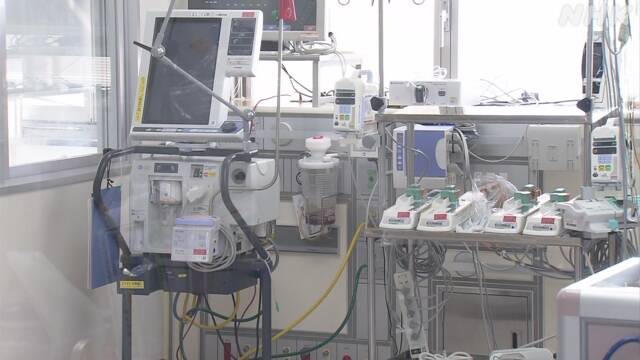Due to the influence of the new coronavirus, the number of operations performed at university hospitals nationwide during the five months until August has decreased by more than 15% compared to the same period last year, according to a survey by an organization created by university hospitals. I understand.
The group is concerned that the postponement of surgery may affect the health of the general population.
The "National Medical School Directors' Meeting", an organization formed by medical schools and university hospitals of national, public and private universities nationwide, is nationwide to investigate how the acceptance of patients with the new coronavirus affects hospital medical care. We conducted a questionnaire survey of 138 university hospitals.
According to it, the number of surgeries performed in the five months until August was 528,600, a decrease of 96,640, or 15.5%, compared to the same period of the previous year. ..
The rate of decline in April and May was particularly large, with a 20% decrease in April and a 32.5% decrease in May.
The group has refrained from seeing patients due to the spread of the new corona infection, many hospitals have reduced the usual medical system, ICU = intensive care unit has been filled, and less urgent surgery has been postponed. I think that is the cause.
Yasuyuki Seto, director of the University of Tokyo Hospital, who serves as a director of the organization, said, "There should be no unnecessary surgery, and I am concerned that procrastination may affect the health of general patients. The biggest concern is the delay in treatment of patients with advanced cancer. Even in the current third wave, there may be effects such as reduction or postponement of surgery. "
At Osaka University Children's Surveillance Hospital
At the Osaka University Hospital in Suita City, Osaka, which responded to the questionnaire of the National Medical School Directors' Meeting, the number of operations from April to August was 4162, which is 404 compared to the same period last year, which is about the rate. It has decreased by 9%.
The rate of decline was particularly large in April and May, with a 14% decrease in April and a 28% decrease in May.
The number of clinical departments with reduced surgery covers 15 clinical departments such as ophthalmology, gastrointestinal surgery, and cardiovascular surgery.
Looking at the types of surgery, there are many non-life-threatening surgeries, such as surgery to restore vision and surgery to sew wounds that do not reach the organs. , Surgery that can be life-threatening if treatment is delayed, such as surgery to remove tumors of stomach cancer or lung cancer or to attach an artificial heart-lung machine, is decreasing.
The most urgent surgery in hospitals is to transfer the patient to a nearby hospital together with a doctor to perform the surgery so that the patient is not affected.
Yuichiro Toki, director of Osaka University Children's Surgical Hospital, said, "ICU is required after surgery for advanced surgery such as at university hospitals. In Osaka, there are many seriously ill patients with the new corona, and the ICU is tight. We are responding with some ingenuity, but there are limits to that. We are concerned that we will not be able to perform advanced surgery in the future. "
Cancer Patient Support Group "Worried about Impact on Patients"
According to the "CSR Project," an organization that supports cancer patients nationwide, there have been reports of cases in which surgery for terminal cancer "stage 4" patients was delayed by one to two weeks due to full beds. It means that there is.
Naomi Sakurai, the representative director of the organization, who is also experiencing cancer, said, "While the spread of the new corona is prolonged, if treatment is postponed, the next wave will come in the meantime, and it will be postponed again. The shape has continued, "he analyzes the current situation.
On top of that, "Given that the spread of infection will continue for a long time, I am worried about the impact on cancer patients. If nothing is done, the survival rate of cancer patients may decline. I understand that the hospital side is really tough. I want cancer patients to maintain their medical system so that they can continue to receive appropriate treatment, including surgery. "

